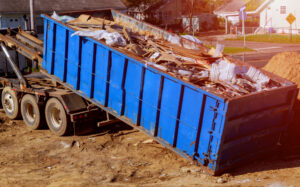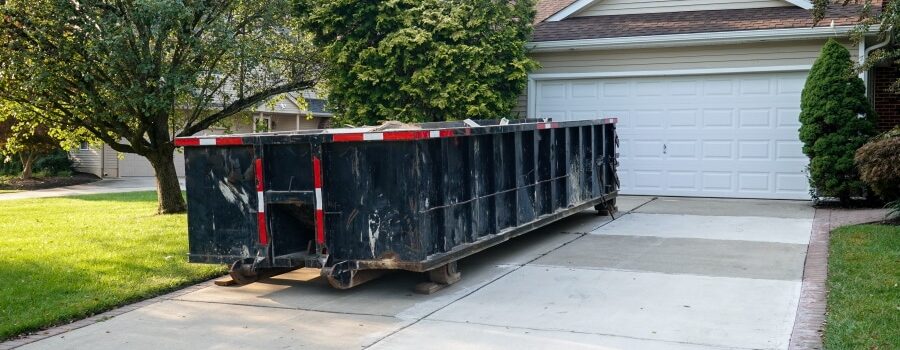The Ultimate Guide to Haul-Away Dumpster Rental: What You Need to Know
Renting a haul-away dumpster can be a practical solution for managing waste, whether you’re working on a home renovation, clearing out clutter, or handling construction debris. Understanding how dumpster rentals work, what factors to consider, and how to choose the right size can help make the process smooth and cost-effective.
Understanding Haul-Away Dumpster Rental
 A haul-away dumpster is a temporary waste container that is delivered to a location, filled with debris, and then removed by a waste management company. These dumpsters are commonly used for large-scale cleanups, remodeling projects, and landscaping work. Unlike regular trash collection services, a dumpster rental allows for the disposal of large and bulky items that may not fit in standard bins.
A haul-away dumpster is a temporary waste container that is delivered to a location, filled with debris, and then removed by a waste management company. These dumpsters are commonly used for large-scale cleanups, remodeling projects, and landscaping work. Unlike regular trash collection services, a dumpster rental allows for the disposal of large and bulky items that may not fit in standard bins.
Dumpsters come in various sizes, making it possible to find one that suits the specific needs of a project. The rental period typically lasts from a few days to several weeks, depending on the agreement with the rental company. Once the dumpster is full or the rental period ends, the company hauls it away and disposes of the waste properly.
Choosing the Right Dumpster Size
Selecting the appropriate dumpster size is crucial for efficiency and cost-effectiveness. The size required depends on the scope of the project and the type of waste being discarded. Small-scale home cleanouts and minor renovations often require smaller dumpsters, while construction projects and major cleanouts may need larger containers.
Dumpster sizes are typically measured in cubic yards, with common options including 10, 20, 30, and 40-yard dumpsters. A 10-yard dumpster is suitable for small cleanups, such as decluttering a garage, whereas a 40-yard dumpster can handle significant amounts of debris from a demolition or commercial project. Estimating the amount of waste beforehand can help in choosing the right size to avoid unnecessary expenses.
Understanding Rental Costs and Fees
The cost of renting a haul-away dumpster varies based on several factors, including the size of the container, the duration of the rental, and the location. Rental companies may also charge additional fees for exceeding weight limits, keeping the dumpster longer than the agreed rental period, or disposing of prohibited materials.
To ensure transparency, it is essential to ask for a detailed price breakdown before renting. Some companies offer flat-rate pricing, which includes delivery, pickup, and disposal fees, while others may charge separately for these services. Comparing prices from different providers and understanding their fee structures can help in making an informed decision.
Permits and Placement Considerations
Depending on local regulations, a permit may be required before placing a dumpster on a public street or sidewalk. In many cases, the rental company can assist in obtaining the necessary permits, but it is advisable to check with the local municipality for specific requirements.
Placement is another critical factor to consider when renting a dumpster. It should be positioned on a stable and level surface that is easily accessible for loading. Driveways and private property are often the best locations, but care should be taken to avoid damaging pavement or obstructing access points.
What Can and Cannot Be Disposed of in a Dumpster
While dumpsters are convenient for disposing of various types of waste, certain materials are prohibited due to environmental and safety concerns. Commonly accepted items include household debris, furniture, construction materials, and yard waste. However, hazardous materials such as chemicals, batteries, tires, and asbestos are generally not allowed.
Electronics, appliances, and mattresses may also have specific disposal restrictions, depending on the rental company’s policies and local waste regulations. Checking the list of prohibited items beforehand can help prevent additional fees and ensure compliance with waste disposal guidelines.
Maximizing Efficiency When Using a Dumpster
To make the most of a dumpster rental, organizing waste efficiently can help maximize space and reduce costs. Placing heavier items at the bottom and distributing weight evenly can prevent overloading on one side. Breaking down bulky materials, such as furniture and large boxes, can also create more room for additional waste.
Keeping the rental period in mind and scheduling pickup in advance can prevent delays, especially for time-sensitive projects. If additional waste needs to be removed, arranging for a second dumpster or scheduling an extra pickup can be a practical solution.

Finding a Reliable Dumpster Rental Company
Choosing a reputable dumpster rental company ensures a hassle-free experience. Reading customer reviews, checking licensing and insurance, and comparing rental terms can help in selecting a trustworthy provider. Transparency in pricing, prompt delivery and pickup, and good customer service are essential qualities to look for in a rental company.
Local companies may offer better pricing and personalized service compared to national providers. Asking for recommendations from contractors, neighbors, or online sources can also help in finding a reliable rental service.